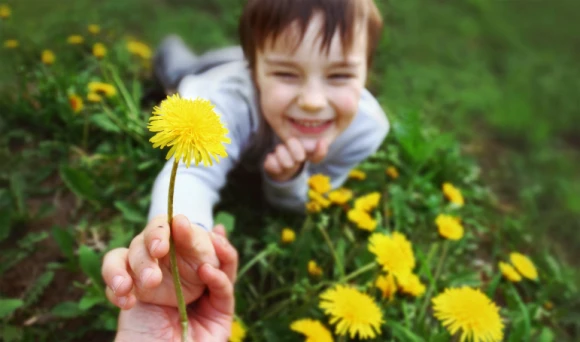Time Required
This practice takes less than 5 minutes.
How to Do It
Parents often talk to their children directly about the importance of being generous. But you can also encourage generosity indirectly by talking about the value of generosity in front of your children.
When talking with other adults around your child, be mindful to say positive things about sharing, kindness, and generosity. For example, you might recount a memory to your co-parent of another child’s act of kindness, while in earshot of your child. You could say, “I’ll never forget how kind our neighbor was when she gave us some balloons from her birthday party after she noticed how much [child’s name] loved them. That was really generous of her to share! It made the day so special for us, too.”
Essentially, you’re engaging in good gossip. Conversations like these can remind your child that sharing is kind and makes someone feel cared about, and that when they don’t share, it’s a missed opportunity to connect with someone.
While this strategy is helpful to keep in mind in general, you can also use it in the moment—when your child is in an ambiguous situation with the opportunity to share, but may be unsure about what is socially expected. This could happen when another child is admiring their toys or watching them play tag with friends at the park, for example.
Remember, the conversation is not meant to be directed at your child; it is simply meant to be overheard by them. This practice is most appropriate for young children between four and six years old and can also be helpful for slightly older children
Why You Should Try It
Even if we believe in the importance of generosity, it can feel hard to practice in small, everyday moments. For children, the extra piece of candy may look too tempting, or they may not want to give up a toy they really love to a kid they don’t really know. But generosity is important for communities to flourish, and research finds that it can improve our well-being.
Even toddlers are happier after giving rather than receiving, and children as young as preschool age understand the connection between generosity and happiness—they expect to feel happy when they share and sad when they don’t. As your children grow into more generous adults, research suggests that they will have greater happiness, stronger and more trusting relationships, and improved physical health, like better blood pressure and sleep. This practice can help children experience the joy that comes with helping others.
Why It Works
Children learn from those around them by observing their behavior and listening to what they are saying. Children learn through the lessons they hear at school and from stories they read in books. In addition to generosity, research suggests that children can also learn from overhearing conversations about honesty.
When children overhear adults making positive or negative evaluations of others, it may lead them to reason about what behavior is appropriate. Talking about generosity around (but not to) your child may help them value and practice sharing more, without feeling like they are being lectured or pressured.
Evidence That It Works
Qin, W., Zhao, L., Compton, B. J., Zheng, Y., Mao, H., Zheng, J., & Heyman, G. D. (2020). Overheard conversations can influence children’s generosity. Developmental Science, 00, e13068.
During an experiment, children were given the opportunity to either keep an extra sticker or give it to another child. Before they made their decision, they overheard one of five conversations between two adults. The conversations either described a child who gave a sticker away as “nice” or “dumb,” or described a child who kept a sticker as “mean” or “smart.” A fifth conversation simply focused on how the adults had found an extra sticker.
Children who overheard the conversations in which the other child was described as either “nice” for giving the sticker away or “mean” for keeping it were more likely to give away their own sticker compared to the other scenarios.
Sources
Li Zhao, Ph.D., Hangzhou Normal University
Parents are role models for their children's generosity. Are you a giver or a Grinch? Take our Altruism quiz to find out.







Comments
and Reviews
Elizabeth First
This quiz was an easy one for me because I am a natural healer who goes into rescue mode immediately when I see some-one/thing in need of assistance/aide. Without thinking, I just react.
The Greater Good Toolkit
Made in collaboration with Holstee, this tookit includes 30 science-based practices for a meaningful life.
The Greater Good Toolkit
Made in collaboration with Holstee, this tookit includes 30 science-based practices for a meaningful life.